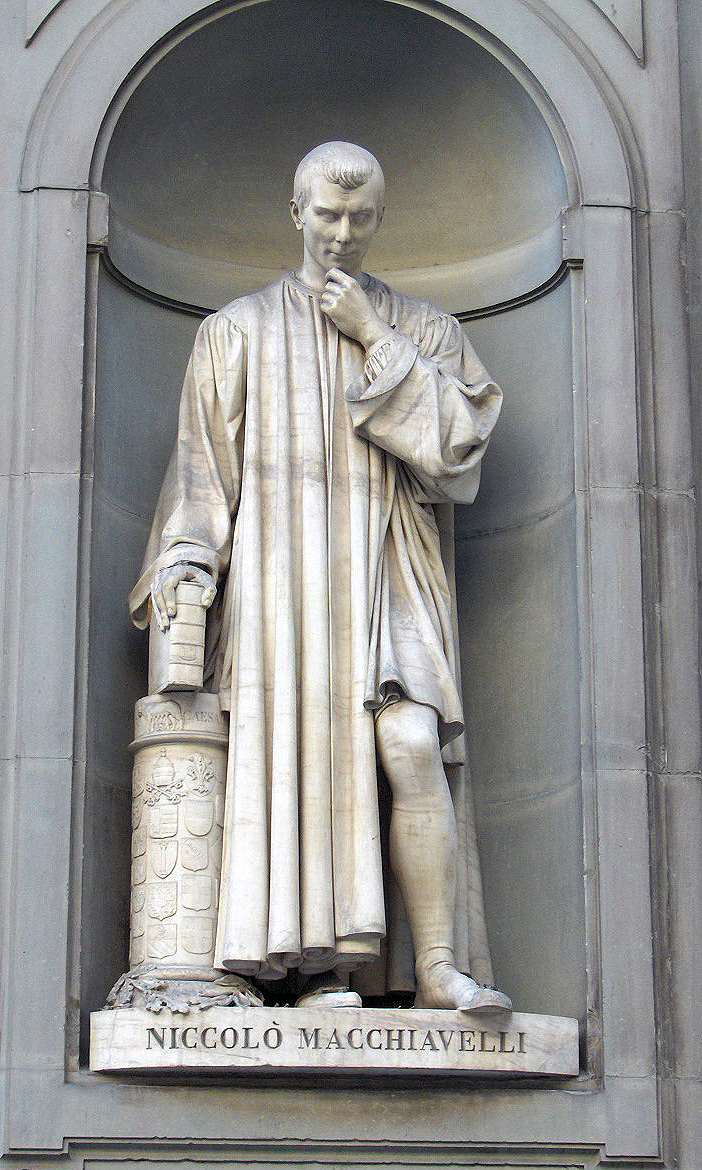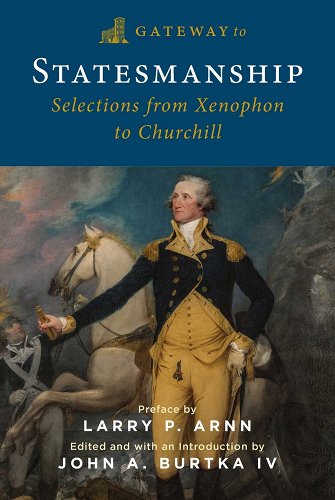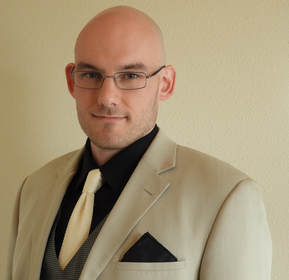I knew this would be a difficult book for me to review, which is why I wanted to review it. Economists are frequently uncomfortable with concepts like statesmanship. Our disposition and training prepares us to study how incentives and information shape the decisions of large groups of people. We have a harder time with individual choosers who, by necessity, grapple with the “dark forces of time and ignorance” in environments where personal characteristics, such as wisdom and fortitude, matter a great deal. But if we wish to understand what sets statesmen apart from mere politicians and functionaries, we have no choice but to wade into the unpredictable and unrepeatable realm of high-stakes, public decision-making, strange though it may seem to social scientists.
John A. Burtka IV, President and CEO of the Intercollegiate Studies Institute, has done students of politics and political economy a service by curating these readings in Gateway to Statesmanship. The excerpts represent the “mirrors-for-princes,” genre, intended as “self-help manuals for political leaders to examine their conduct and appearances.” Ancient, medieval, Renaissance, and modern leaders share their insights on ruling, acquired through years of study or practice—often both. The advice is highly practical. It defies theoretical generalization in the manner familiar to today’s economists, political scientists, and sociologists. We must shake the rust off our faculties of prudential moral reasoning to profit from these texts.
Burtka’s introductory essay provides important context for the selections to follow. He surveys broad historical trends that shape political developments, and hence writings about statesmanship. He also discusses major themes that regularly appear in the tradition of Western (and a few non-Western) governance treatises. Burtka’s analysis culminates in “twelve laws of leadership that are applicable in all times and places. They are of relevance not only to the statesmen, but also to the CEO, the entrepreneur, the student body president, the captain of a sports team, and anyone striving to become a ‘prince’ in his or her particular domain.” The pages distilling these lessons reward careful reading and rereading.
I cannot summarize the twenty chosen authors’ political wisdom. I will not even try. There is no substitute for reading Cicero, St. Thomas Aquinas, Erasmus, George Washington, and their distinguished compatriots of the soul in their own words. Instead I will focus on what makes these texts so challenging for economists. Hopefully, this shows us why economists and others accustomed to quantification and numerical analysis should take these works seriously.
As I mentioned, economics is most powerful when it is forecasting and explaining the behavior of large groups. Markets are the typical example. Individuals have all sorts of foibles that make them hard to predict. But once you throw them together in a market, personal characteristics become much less relevant. Now the constraints of the system select for the outcomes we observe.
Call the operative force in markets the Mechanism. As an engine of analysis, it is internally complete and intellectually satisfying. When prices and incomes change, we know how consumers’ budget sets change. When wages, interest rates, and technology change, we know how firms’ production sets change. In the aggregate households’ and businesses’ idiosyncrasies cease to matter. The interpersonal tradeoffs, especially relative prices, drive everything. This is the Mechanism at work: Competition and cooperation within the price system foster a sophisticated and sublime coordination process. It is impossible for a properly trained economist not to feel a sense of awe.
The Mechanism is what we study. The Mechanism is what we teach. Those who belittle the Mechanism are fools. Understanding the Mechanism, how it works, and what it does for society are likely the most important discoveries not only of economics, but all the social sciences. I believe in the Mechanism, I stand by the Mechanism, and I will defend the Mechanism until my dying day.
And yet.
We know the Mechanism rests on an institutional foundation. Without secure property rights, there would be no market prices nor profit and loss signals. And secure property rights themselves depend on representative government, constitutionalism, and the rule of law. We cannot take these more basic institutions for granted. They come at the end of a very long, and often dangerous, political road. (One of the few things I and ex-Labour PM Gordon Brown agree on is his quip, “When establishing the rule of law, the first five centuries are the hardest.”) And at critical junctures along that road, unique individuals in positions of high authority—statesmen—made conscious decisions to do what was right instead of what was easy, growing and preserving the inheritance of ordered liberty that we all enjoy.
It is indisputable that, on occasion, men of character make personal decisions that have world-historical consequences. Our lives today would be very different but for those decisions. Leaders make extraordinary choices under irreplicable circumstances. They defy prediction and control, in the conventional scientific sense. Institutions make the Mechanism, and statesmanship (sometimes) makes institutions. It seems the Mechanism has some decidedly unmechanistic roots.
Admittedly, economists are not completely without a foothold when exploring personal influence over important events. The closest conceptual analogue is entrepreneurship. Unsurprisingly, economists fight like cats and dogs about precisely what entrepreneurship is. Without wading into the murky waters of social ontology, the paradigm that fits most comfortably with statesmanship holds that entrepreneurship entails risk-bearing under conditions of uncertainty. Entrepreneurial action requires judgment: case-by-case evaluations of problem scenarios that cannot be analyzed probabilistically, at least in a frequentist sense. Entrepreneurs need wisdom, prudence, and foresight to reason about likely outcomes and consequences.
Entrepreneurship is a universal feature of human action. Every social sphere contains entrepreneurs, meaning people acting entrepreneurially, possibly but not necessarily specializing in functions we conventionally label “entrepreneurial.” There are market entrepreneurs, social entrepreneurs, and even political entrepreneurs. This last is a promising avenue for studying statesmanship.
Consider the advice of Agapetus the Deacon to Emperor Justinian: “Impose on yourself the necessity of keeping the laws, since you have on earth no one able to compel you.” Here Agapetus is making a point about sovereignty. The sovereign compels and is uncompelled. In any political hierarchy, somebody will be sovereign, if only de facto. Nobody can give the law to the sovereign; he is in a meaningful sense much less constrained than his subjects. And fewer constraints means more variability. The sovereign impresses his subjectivity—will, character, judgment—on the polity. Hence the statesman is a sovereign entrepreneur.
There is no way to eliminate personality from politics. This is a hard truth for those steeped in the Madisonian tradition of government. We want to put our trust in rules rather than men. This is clearly a worthy endeavor. Our constitutional architecture is predicated upon it. But as the Founders themselves knew, no matter how strict are the rules governing men, the peculiarities of men will always influence the writing and (much more importantly) interpretation of the rules. A good sovereign entrepreneur, one deserving the label “statesman,” will work to sustain and renew the American system. A bad sovereign entrepreneur will work to weaken and corrupt it. To sustain ordered liberty, we must orient our character-forming institutions to producing good sovereign entrepreneurs. The ship of state has no autopilot.
Interestingly, economists themselves often act as political entrepreneurs, although rarely sovereign entrepreneurs. They populate various agencies and departments, purporting to be efficiency experts on behalf of the government. However, this bureaucratic and technocratic approach to public service (if it can be called that) has many pitfalls. Policy economists see themselves as mere servants. Yet because their specialized knowledge and subject matter shapes public discourse, they increasingly wield power without bearing responsibility—a recipe for political tragedy. “The vulgar are always taken by what a thing seems to be,” Machiavelli reminds us. That includes economists and our self-deceptions about our public role.
Many of my economist friends recognize the sorry state of ordered liberty in America, as well as the economics profession’s complicity in undermining it. Their response is political quietism, often combined with a disdain for politics and public affairs as such. (If you have ever encountered an economist who hectors you not to vote, you know exactly this attitude.) Imagine my surprise upon reading the excerpt from St. Thomas More’s Utopia, which deals with this exact theme. The renowned English statesman converses with an itinerant philosopher named Raphael. More implores Raphael to “apply [his] time and thoughts to public affairs” by entering the service of a prince. Raphael refuses, insisting princes and their counselors care only for wealth, prestige, and advantage, rather than honor, justice, and the common good. “There is no room for philosophy in the courts of princes,” Raphael laments.
The resemblance of Raphael’s arguments to ones I encounter every day is uncanny. I was eager to read More’s reply. It did not disappoint: “Go through the play that is acting the best you can, and do not confound it because another that is pleasanter comes into your thoughts…You must not, therefore, abandon the commonwealth, for the same reasons as you should not forsake the ship in a storm because you cannot command the winds.” Ironically, More castigates many of my disillusioned colleagues for forgetting about constraints! Rather than mourn the perfect worlds that do not exist, we should find the courage to make an imperfect world imperfectly better.
At their best, economists use their skills to bolster the institutions of self-governance. Representative democracy, meaning government by discussion rather than domination, is the proper political order for a society of free and dignified equals. Economists should ply their craft in public by rejecting technocracy and embracing citizenship. As Theodore Roosevelt reminds us, “The average citizen must be a good citizen if our republics are to succeed…and the average cannot be kept high unless the standard of the leaders is very much higher.” The challenge for economists is to balance the due weight their expert opinions deserve with the insistence that no amount of expertise deserves a privileged position in the public square. Leadership is not above citizenship, but it is a mode of its expression for the benefit of the community.
“Shame upon the man of cultivated taste who permits refinement to develop into fastidiousness that unfits him for doing the rough work of a workaday world,” Roosevelt continues. For economists, this means refusing to hide behind the mirage of our work’s value-neutrality. When we crunch numbers for the Federal Reserve, for example, we are taking a public position. When we refuse to engage our fellow citizens, we are also taking a public position. There is such a thing as non-partisan economics. But there is no such thing as non-political economics.
“Those who always profess that they would like to take action, if only the conditions of life were not exactly what they actually are,” pave the road to serfdom. Those who wish to live in a free state must learn both the lessons of statesmanship and the laws of economics. We economists have a special responsibility to mediate between predictive science and moral philosophy so the statesmen can exercise discerning judgment.
Image via Wikimedia Commons






